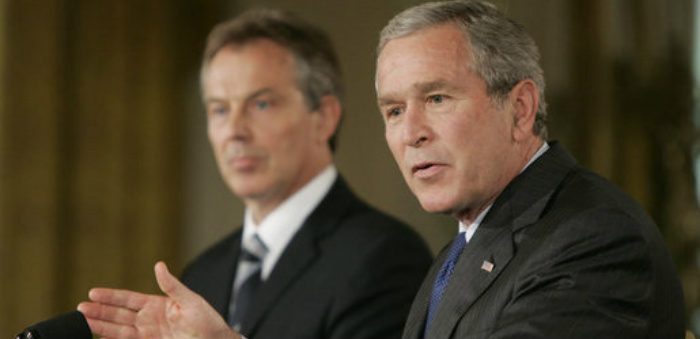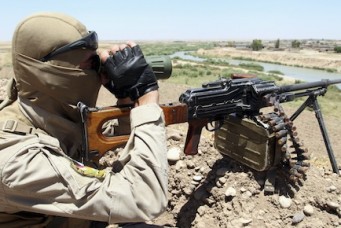Tony Blair’s Iraq Legacy
The Chilcot Inquiry’s findings have shed new and unflattering light on the UK’s involvement in the 2003 invasion of Iraq.

Prime Minister Tony Blair and President George W. Bush at the White House, Washington, D.C., July 28, 2006. Paul Morse/Wikicommons
As Iraqis continue to grieve the losses from the devastating suicide bombing that killed some 250 people over the weekend, Wednesday saw the release of the Chilcot Inquiry’s report on the United Kingdom’s involvement in the 2003 invasion of Iraq that cost the country 179 service personnel. The report was seven years in the making and was released thirteen years after the original invasion. It took evidence from 150 witnesses, cost more than £10 million to produce, and weighs in at an astonishing 2.6 million words.
The much-anticipated release has been followed by reaction from every corner of the British political establishment in an orgy of hindsight. Much of this has been a study in confirmation bias, with those against the war heralding it as a devastating indictment of former British Prime Minister Tony Blair’s government while senior figures with responsibility for the conflict claim to the contrary that it dispelled accusations of lies and deceit.
The essence of the heated and long-term debate on the Iraq war is fundamentally about a decision to join the American invasion and what lay behind it. Much of this focus has understandably been about intelligence around Iraq’s weapons of mass destruction (WMD). Sir John Chilcot, who led what was a fully independent inquiry, described the intelligence as “flawed.” We now know that it was wrong, and Saddam Hussein wasn’t in possession of such weapons.
Once this was revealed following the invasion, the lead protagonists moved to a debate about the nature of the Saddam regime and how Iraq (and the world) would be a better place now that he’s gone. The subsequent mismanaged occupation and the unleashing of the civil war as the Iraqi state collapsed made that hard to argue. Last week’s bombing and the fact that the so-called Islamic State still occupies Mosul, the country’s second largest city, is testimony to how bad things have got since.
But what have we really learnt that is new from Chilcot?
One of the key findings from the report is the release of new correspondence between Prime Minister Blair and President George W. Bush that shines a light on the meta-narrative behind the decision to join the U.S.-led invasion.
Blair wrote to Bush, “I will be with you, whatever.” This is the key and essential line, a microcosm of all complexity to a single and compelling proposition: That the British prime minister felt, following 9/11, it was in Britain’s best interest to stay as close as possible to an American administration in the White House hell bent on remaking the region as part of the backlash to the fall of the World Trade Center.
Senior advisors within the Bush administration saw 9/11 as giving them a blank check for the U.S. superpower to pursue “full spectrum dominance” with a particular focus on remaking the Middle East. Iraq was in the crosshairs while smoke was still rising from ground zero in New York. WMD was the justification but never the real reason for the push to invade. Hence Chilcot is right when he says that “the UK chose to join the invasion of Iraq before the peaceful options for disarmament had been exhausted.”
It is of course correct to interrogate and challenge the legal analysis, the use of intelligence and decision-making processes at Number 10 and Parliament, but this surely must be against a better understanding of the wider reasons of geopolitics underpinning the conflict.
This is where perhaps Chilcot is at his most devastating regarding the legacy of Blair. The inquiry was ironically commissioned by Blair’s great Labour colleague and rival Gordon Brown when he held the premiership. Chilcot suggests that Blair placed trying to maintain the special relationship with the United States ahead of our national interest. Yet crucially the report also says that Britain’s relations with Washington would not have been damaged had we stood aside from military action, stating that had “the UK stood by its differing position on Iraq—which was not an opposed position, but one in which the UK had identified conditions seen as vital by the UK Government—the Inquiry does not consider that this would have led to a fundamental or lasting change in the UK’s relationship with the U.S.”
Being seen as an uncritical and naïve Atlanticist may be the toughest legacy from the inquiry for Blair to shrug off. The repercussions from this vast report on the foreign policy making mechanisms of the UK will reverberate for some time as people digest its scale while managing the current period of flux brought about by Brexit. Meanwhile in Iraq people continue to bury their dead from the last bombing and fear for the next to come.
James Denselow is a research associate at the Foreign Policy Centre. He has contributed to the Guardian, Huffington Post, New Statesmen, and others. On Twitter: @jamesdenselow.
Subscribe to Our Newsletter




